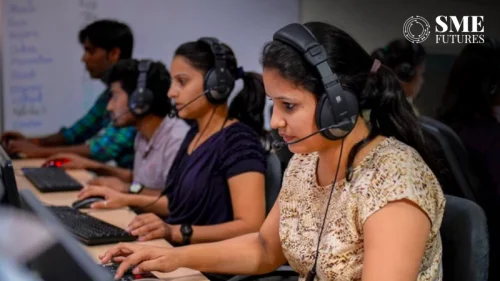According to tracking by the Johns Hopkins University, the total number of people infected with the coronavirus has now surpassed 2 million. As of April 16, 2020, the cumulative number of cases in the United States had reached 640,000 – making it by far the most affected country in terms of total cases. Outbreaks in Europe are proving extremely worrying with several countries having passed 100,000 confirmed cases.
As the whole world is dealing with the deadly coronavirus, small businesses and MSMEs (micro, small and medium enterprises) across the world are struggling for their survival. In India, there are over 70 million MSMEs, the largest provider of employment, gasping for breath amid the lockdown.
The virus outbreak has just made the situation worse for the sector, which was already reeling from the economic slowdown. The current crisis, that has brought manufacturing and supply chain to a halt, is also expected to impact the revenue from customs.

Although the domestic revenue may stabilize in the next couple of months, the import and export transactions would remain impacted for a longer period.
The time to bounce back will depend on the sector – where services sector may take 30-60 days to recover, while the revival of manufacturing sector will be at least 6-12 months away – that, too, only if the MSME has been a profitable entity.
In an interaction with SME Futures.com, Heather Bain, managing member, Bain CPA Business Strategies, LLC, shares insights on how small businesses can position themselves to recover from the Covid-19 pandemic.
Edited Excerpts:
Could you tell us a bit about yourself, and how is life professionally for you right now?
I am working as a small business consultant in Houston, Texas. With the advent of new Small Business Administration (SBA) loan programmes, including the Paycheck protection programme and the many changes in my clients’ operations, I have been busier than ever. My clients want financial forecasts, revised budgets, what-if scenario analysis, and help with financing.
Additionally, as an adjunct accounting professor, I have been teaching and tutoring via an online platform instead of the usual classes on campus. In all areas of work, the transition has been cumbersome.
What are your suggestions for small businesses during this crisis?
India is home to one of the largest micro, small, and medium enterprises (MSMEs) base. Small businesses across the country are facing the major brunt of the pandemic and are vulnerable to the current situation. These businesses largely operate on limited cash resources and huge fixed costs.
It is extremely important for these businesses to continue to be ethical and treat their employees with respect. Leaders need to assess the current situation carefully, preferably with a team of experts, to get a comprehensive view of the situation, followed by building a plan to avoid a knee jerk reaction and finally communicate calmly, clearly, and continuously with relevant stakeholders.
In addition, SMEs must look for new revenue streams to help keep their businesses relevant. When crisis occurs, wealth and value are transferred through creativity and readiness to seize new opportunities.
What have you found to be the single toughest nut to crack in this situation?
‘Forecasting’ is the most difficult aspect of the current situation. It is widely accepted that we have entered a new reality, but the full financial and cultural impact of the recent changes is still unknown.
What impact do you expect this crisis to have on the jobs market?
The nationwide lockdown has disrupted the jobs market and triggered a mass scale of unemployment across the country. We will see a direct impact on the gig economy, MSMEs and daily wage earners. A lot of companies will freeze hiring. Various sectors will be impacted by the ongoing crisis with some feeling the pressure more than others, specifically tourism and hospitality, automotive, retail, manufacturing and aviation.
The overall hiring sentiment in the country is likely to witness an adverse impact in the short term, especially in the services sector.
As noted above, in times of crisis, creativity and readiness to seize new opportunities can make a tremendous difference in outcomes. This also applies to the job market, whereby job seekers can use this transition to re-train and upskill in order to maximize their potential for revenue generation.
What are the five things that SMBs can do to navigate these challenging times?
Due to the unprecedented economic environment, it is crucial to assess the situation to determine planning. Deliberate planning and action may prove to be the key to building a stronger business capable of withstanding the test of time. I would suggest:
- Cashflow considerations: Understanding the cash and working capital needs is the most important first step in any cashflow management strategy. Consider assessing your cashflow situation for multiple time frames, such as 60 days, 90 days, and six months. Each of these time frames may require further consideration of different scenarios.
- Document expected payments: An important first step is documenting all your payments to get a complete picture. Work through what your revenues, expenses, and cash flow will look like over the time frame you are trying to manage.
- Apply the 80/20 rule: Post assessing the situation, identify the 20 per cent of customers that bring you 80 per cent of your revenue, and focus your attention on collecting what you can, from them. Prioritize existing and long-term relationships over newer ones. Those are the customers who are most likely to understand and be willing to work with you.
- Consider factoring: If your accounts receivables are significant, factoring may be another option. If you consider this alternative, make sure you understand the terms of any agreement, so you can approximate these costs for your cashflow projections.
- Operating costs: Reach out to vendors and ask for payment term extensions.
Are there examples where you feel the organizations are really getting this right?
Yes. I have recently worked with a research consulting business that has shifted to a more client-focussed approach with their business.
The owners have rallied the employees around the concept that at every level of the organization, they are to survey the client’s needs. Even outside of the scope of current service offerings, bring ideas to the management team to brainstorm the best way to meet the client’s needs – which may open new revenue streams and deliver the best level of service possible.
Although this business model is ideal in any business environment, it is crucial to sustaining revenue and value in lean times.
Institute of Management Accountants (IMA) recommends three steps to survive the scenario. However, mom and pop store owners do not have the infrastructure or a team. How will they revive?
Small scale businesses need to revaluate their decisions, determine a plan and get a clear picture in order to ensure business continuity. They need to apply a three-step recovery planning framework.
The proposed assess-build-communicate (ABC) process enables leaders to evaluate the current situation, preferably with a team of experts, build a plan and in turn communicate calmly, clearly, and continuously with relevant stakeholders.
- Assess the situation – the first step is to get a clear picture of where the business stands and determine what the situation is. Start with the assessment of cashflow, since managing cashflow is critical for survival. Document all your payments and prioritize the existing and long-term ones, which bring in the 80 per cent of your revenue. At this point, try to cut down on administrative costs that do not generate revenue. Lastly, the largest expense must be addressed, which includes salary cuts and reduction of payroll costs to ensure business continuity.
- Build a plan – once a business has evaluated its cash position, they must gather all financially relevant data points to create a clear picture of reality vs. expectation.
- Communicate – once the plan has been developed, it is important to communicate it, while identifying each required step, the person accountable for completing it, and the actions and budgeted cashflow needed to realize it. Companies must also specify the goals and objectives of each initiative they undertake.
Crises, as seen historically, are opportunities for change. Are you optimistic that as we come out of this crisis, it could be a chance to create a better economy?
Every crisis is an opportunity. Once we emerge from this, the industries globally will focus on innovation and developing technologies to transform businesses in the future to combat disruptions like Covid-19.
We are already seeing early signs of a shift in how consumers and businesses behave. Remote working is being encouraged by tech and non-tech companies alike. Supply chains are getting disrupted globally, and retail stores are adapting to the new reality. Some of these changes are direct, short-term responses to the crisis and will revert to regular levels once Covid-19 is contained.
However, some of these shifts will continue, creating a long-term digital disruption that will shape businesses for decades to come.
Let’s fast forward to an optimistic scenario. It’s March 2021. The economy has recovered. What do you hope will have changed to make it a better economy for small businesses?
After this emergency is resolved, the leaders of many small businesses will be more aware to consider preparations for other types of business interruptions. Deliberate planning and action may prove to be the keys to building a stronger business capable of withstanding the test of time.











